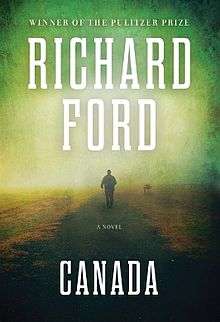Canada (novel)
Canada is a 2012 novel by American author Richard Ford.[1] The novel follows 15-year-old Dell Parsons, who must learn to fend for himself after his parents are arrested for robbing a bank.[2] The book also re-visits Great Falls, Montana, a setting that Ford frequently uses in his work.[3] It was Ford's first "stand alone" novel since Wildlife (1990).[4]
 First edition (Canadian) | |
| Author | Richard Ford |
|---|---|
| Country | United States |
| Language | English |
| Publisher | Ecco Press |
Publication date | June 2012 |
| ISBN | 1-4434-1111-6 |
| Preceded by | The Lay of the Land |
Plot
After his parents are arrested for robbing a bank, fifteen-year-old Dell Parsons is left to fend for himself. His twin sister Berner has run off, leaving him to a family friend who secrets him away to Saskatchewan, Canada. There Dell is to live with the American Arthur Remlinger, a man with a cool demeanor and a hidden inner violence that threatens Dell's well-being.
Development
The work on Canada took Ford twenty years,[5] with the author stating that he took inspiration from several different sources.[6] Ford stated that some of the elements in the book, such as the feeling of "not [being] connected with the larger forces of a culture I was by accident born into", were drawn from his personal experiences.[6] He also expressed an interest in the aftermath and consequences of crimes such as murder and robberies, and the effect they have on the young family members of the perpetrators, as well as the "closeness to which normal life bears upon felonious life".[7]
Reception
Critical reception for Canada has been overwhelmingly positive,[8][9] with The New Yorker comparing the book to William Maxwell's So Long, See You Tomorrow and Ford's previous novel Wildlife.[10] The latter book also used Montana as a setting and, like Canada was a "stand alone" novel (i.e., not featuring Frank Bascombe as a protagonist).[4]
Praise for the novel centered on the book's narration, which is told from the viewpoint of an older Dell, and the book's clarity and simplicity.[11][12][13] The Daily Telegraph cited Ford's "genius at capturing human frailty and its pitiful disguises" as a highlight while the Washington Post praised the book's "plainspoken lines".[14][15]
The novel received the American Library Association's 2013 Andrew Carnegie Medal for Excellence in Fiction.[16]
References
- "Richard Ford". Colbert Nation. Retrieved 5 November 2012.
- Ulin, David L. (May 27, 2012). "Richard Ford finds his place". The Los Angeles Times. Retrieved 22 July 2012.
- Adams, Tim (17 June 2012). "Richard Ford: 'America beats on you so hard the whole time'". Guardian. London. Retrieved 5 November 2012.
- "Richard Ford wins Princess of Asturias Award for Literature".
- "Canada author Richard Ford: I gave away the plot". BBC News. 14 September 2012. Retrieved 5 November 2012.
- Ciabattari, Jane. "Richard Ford Talks About His New Novel 'Canada'". Daily Beast. Retrieved 5 November 2012.
- Brown, Jeffrey. "Richard Ford's Latest Novel 'Canada' Is Actually an American Morality Tale". PBS. Retrieved 5 November 2012.
- Gorra, Michael. "Richard Ford's "Canada" Is His Best Novel In Years". Daily Beast. Retrieved 5 November 2012.
- Hensher, Philip (3 June 2012). "Canada, By Richard Ford". Independent. London. Retrieved 5 November 2012.
- Moore, Lorrie. "CANADA DRY". New Yorker. Retrieved 5 November 2012.
- Dubus III, Andre (7 June 2012). "Points North". New York Times. Retrieved 5 November 2012.
- O'Hagan, Sean (3 June 2012). "Canada by Richard Ford – review". Guardian. London. Retrieved 5 November 2012.
- Hoover, Bob (17 June 2012). "Richard Ford's 'Canada': the most ambitious and personal novel of his career". Post Gazette. Retrieved 5 November 2012.
- Daniel, Lucy (28 June 2012). "Canada by Richard Ford: review". Telegraph. London. Retrieved 5 November 2012.
- Charles, Ron (21 May 2012). "'Canada,' by Richard Ford". Washington Post. Retrieved 5 November 2012.
- Italie, Hillel. "Ford, Egan win literary medals", San Jose Mercury News, June 30, 2013. Retrieved July 1, 2013.